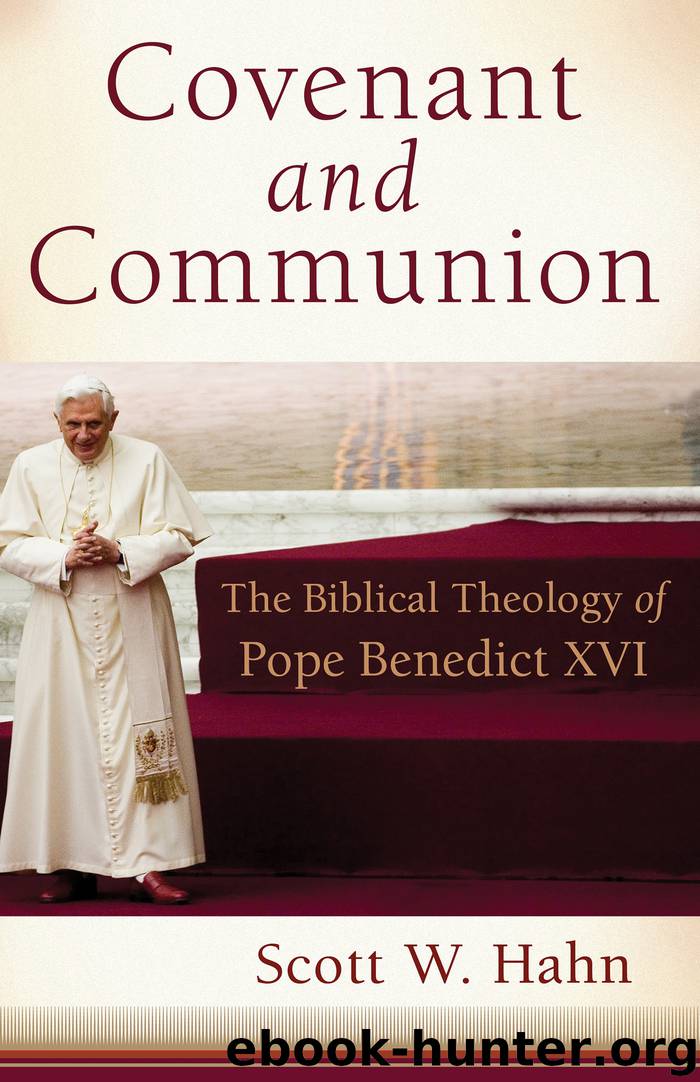Covenant and Communion by Scott W. Hahn

Author:Scott W. Hahn
Language: eng
Format: epub
Tags: Catholic/Biblical Theology, Benedict XVI, Pope, 1927–, Theology, Catholic Church—Doctrines, REL067000, REL006080, REL010000
Publisher: Baker Publishing Group
Published: 2009-09-30T16:00:00+00:00
6
The Theology of the Divine Economy
Covenant, Kingdom, and the History of Salvation
The Covenant as the Meaning of the Divine Economy
Because he reads Scripture typologically as a unity (and makes use of the insights afforded by modern historical and literary tools), the Bible tells a “coherent story” for Benedict.1 It is the story of God’s creation and salvation of the human race. For Benedict this typological reading, which consists in “the elucidation of signs” found in the biblical text, reveals a divine “economy” or salvation history.2
Although he apparently prefers to talk about “salvation history” rather than the divine “economy,” Benedict’s understanding of salvation history reflects the patristic distinction between economy (oikonomia) and theology (theologia), wherein the economy consists of the deeds and words by which God reveals himself in history, and theology refers to the inner trinitarian life of God that is revealed to us by the economy.3
Adopting another patristic term, Benedict sees in the economy the outworking of a divine “pedagogy.” By a long historical tutelage that culminates in the revelation of Christ, God is adapting the human race to his own ways and preparing humans for communion with him. In saying this, Benedict embraces the ideas of St. Irenaeus.4 The divine pedagogical intent is the meaning of the Old and New Testaments as understood in their “inner continuity and coherence.”5 In fact, as Benedict sees it, “The totality of the Scriptures on which the Christian faith rests is God’s ‘testament’ to mankind, issued in two stages, as a proclamation of his will to the world.”6
The divine economy, then, is the content of Scripture. This economy, by which the history of the Old and New Testaments is unified into a single history of salvation in Christ, reveals a theology, the “mind” or intention of God. God’s intent, his will for the world, is his testamentum, or covenant, with humanity. By his covenant, God desires to father his people, making all men and women one family with him in a communion of love. The plan of the covenant, which Benedict calls an “ineffable plan of love,”7 is the ultimate content and meaning of Scripture. This notion of covenant and economy in turn lies at the heart of Benedict’s Christology and ecclesiology, which is expressed in his magisterial teaching that the Church is “God’s family,” the living subject by which “the Father . . . wishes to make humanity a single family in his Son.”8
Benedict’s biblical theology of the covenant synthesizes a great deal of scholarship, beginning with the modern exegetical finding that “the internal beginning of the Old Testament lies . . . with the reality of the covenant.”9 He presents the covenant not as a contractual relationship entered into by parties of equal standing but as being “modeled after” ancient Near Eastern pacts between feudal lords and their vassals. “The ‘covenant’ is not a two-sided contract but a gift, a creative act of God’s love. . . . God, the King, receives nothing from man; but in giving him his law, he gives him the path of life.
Download
This site does not store any files on its server. We only index and link to content provided by other sites. Please contact the content providers to delete copyright contents if any and email us, we'll remove relevant links or contents immediately.
The Five People You Meet in Heaven by Mitch Albom(3569)
The Secret Power of Speaking God's Word by Joyce Meyer(3220)
Real Sex by Lauren F. Winner(3023)
Name Book, The: Over 10,000 Names--Their Meanings, Origins, and Spiritual Significance by Astoria Dorothy(2987)
The Holy Spirit by Billy Graham(2953)
0041152001443424520 .pdf by Unknown(2846)
How The Mind Works by Steven Pinker(2816)
ESV Study Bible by Crossway(2778)
Ancient Worlds by Michael Scott(2689)
Churchill by Paul Johnson(2587)
The Meaning of the Library by unknow(2572)
The ESV Study Bible by Crossway Bibles(2551)
The Gnostic Gospels by Pagels Elaine(2531)
MOSES THE EGYPTIAN by Jan Assmann(2417)
Jesus by Paul Johnson(2363)
City of Stairs by Robert Jackson Bennett(2354)
The Complete Dead Sea Scrolls in English (7th Edition) (Penguin Classics) by Geza Vermes(2283)
The Nativity by Geza Vermes(2233)
Ancient Near Eastern Thought and the Old Testament by John H. Walton(2226)
